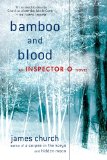Summary | Excerpt | Reviews | Beyond the book | Read-Alikes | Genres & Themes | Author Bio

A government bus filled with imprisoned illegal monks has overturned. Two women in an approaching sedan have been killed. Now Shan, an exiled Chinese national and a former Beijing investigator, must find the murderer.
Shan Tao Yun is an exiled Chinese national, a former Beijing investigator, on parole from the Tibetan gulag to which he had been consigned as punishment. He is ferrying a corpse on muleback over the slopes of Chomolungma - Everest - at the request of a local wisewoman who says the gods have appointed this task to him, when he encounters what looks like a traffic accident. A government bus filled with imprisoned illegal monks has overturned. Should the escaping monks be caught, the brutal Chinese knobs will punish them. Then Shan hears gunfire. Two women in an approaching sedan have been killed. One is the Chinese Minister of Tourism; the other, a blond Westerner, organizes climbing expeditions. Though she dies in his arms, Shan is later met with denials that this blond foreigner is dead.
Shan must find the murderer, for his recompense will be the life and sanity of his son, Ko, imprisoned in a Chinese "yeti factory" where men are routinely driven mad.
An intricate yet logical plot, deep character construction and a wonderful sense of atmosphere combine to form a truly top-notch mystery novel...continued
Full Review
 (616 words)
(616 words)
(Reviewed by Kim Kovacs).
Tibet, a remote region along the southwestern border of China, sits at 15,000 feet above sea level between the Himalaya and Kunlun mountain ranges. The first recorded king of the region was Srong-btsan sgam-po, who is credited with introducing Buddhism to Tibet around 640 AD. He and his descendants ruled over a unified Tibet through the 8th century, but the empire eventually collapsed into a collection of small independent kingdoms.
 Map of Tibet
Map of Tibetclick for larger image including key |

If you liked The Lord of Death, try these:

by Lisa Brackmann
Published 2011
American Ellie Cooper, deserted by her husband, has made a number of friends in China. But suddenly one of them disappears, and security organizations are hounding her for information. Contacted through an online role-playing game by a group claiming to be friends of Lao Zhang asking her for help, Ellie does the only thing she can - keep on ...

by James Church
Published 2010
When the wife of a North Korean diplomat in Pakistan dies under suspicious circumstances, O is told to investigate, with a curious proviso: Don’t look too closely at the details, and stay away from the question of missiles. Soon, however, the Inspector discovers he is up to his ears in missiles - and somebody wants him dead.
To be ignorant of what occurred before you were born is to remain always a child
Click Here to find out who said this, as well as discovering other famous literary quotes!